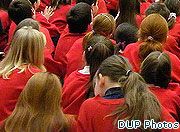A boy who mistakenly wrote that he lived in a “terrorist” house rather than a “terraced” house has been visited by police after teachers reported him under ‘counter-terrorism’ rules.
Teachers are obliged to report suspected ‘extremist’ behaviour to police following the introduction of the Government’s Prevent strategy – part of its counter-terrorism agenda.
In September a Prevent worker at a Huddersfield college claimed that voicing criticism of homosexuality “might be breaking the law“.
Traumatised
The latest incident centres on an unnamed boy, who is 10 years old and a Muslim. He attends a school in Lancashire and has reportedly been left traumatised by the episode which happened after his mistake in an English lesson.
Speaking to the BBC, his cousin said the family was “absolutely disgusted” by the experience, which also saw a family laptop being searched.
The cousin, who has also not been named, said the young boy became “more isolated, he wasn’t talking to anybody at that time, he wasn’t sleeping and eating properly, he was just hiding away in a blanket”.
No further action
Lancashire Police confirmed that a visit had taken place, but that it was not by anyone from Prevent.
an individual who encourages others to develop or adopt beliefs
Govt's definition of a 'radicaliser'
“There were not thought to be any areas for concern and no further action was required by any agency”, the force said.
The school said it was investigating the matter and so was unable to comment.
Later, in a joint statement, Lancashire County Council and Lancashire Police said it was “completely untrue to suggest this situation was brought about by a simple spelling mistake”.
Mobile phones
Yesterday, Education Secretary Nicky Morgan launched a website aimed at helping parents and teachers stop children from getting involved with “twisted ideologies”.
However, educateagainsthate.com was criticised on BBC Radio 4 for being overly broad. It says that children who are argumentative or spend large amounts of time on mobile phones could be at risk from radicalisers.
“I’m sure most people who are parents of teenagers would say that these are the things that they probably see all the time with their children”, presenter Mishal Husain commented.
The website also defines a “radicaliser” as, “an individual who encourages others to develop or adopt beliefs”.

